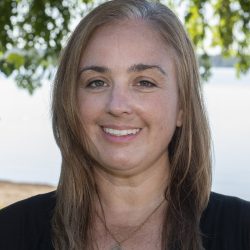Biography
Degrees
Bemidji State University Bachelor of Science in Psychology
Bemidji State University Master of Science in Counseling Psychology
Training: EMDR Trained, Managing and Adapting Practices (MAP), Trauma-Focused Cognitive Behavioral Therapy (TF-CBT), Personality Disorder Training with Gregory “Gary” Lester, Acceptance and Commitment Training (ACT)
Research Interests
Exploring the different experiences of marginalized populations. On-going training explores the impact those experiences has on mental health.
Clinical Training
Counseling on Access to Lethal Means February 2020, January 2022
CAMS CARE Assessing and Treating Suicidal Risk, May 2022
Eye Movement Reprocessing and Desensitization (EMDR) July 2021; EMDR 2.0 May 2022
Recent Traumatic Event Protocol (R-TEP) & Group Traumatic Episode Protocol (G-TEP) EMDR Jan. 2023
Approved Clinical Supervisor (ACS) December 2021
Trans Affirming Care May 2023
The Sexual Assault Evaluation July 2023
Assessment, Intervention and Critical Response to Violence on Campus April 2025
Counseling Experience
My counseling experience spans a variety of settings, including outpatient community mental health agencies, mobile crisis teams, college counseling centers, and private practice. I have worked with both adolescents and adults, providing individual therapy, facilitating therapeutic groups, and delivering educational presentations on a range of mental health topics.
My approach is grounded in Psychodynamic, Adlerian, and Rogerian (Person-Centered) theories. I believe that much of human behavior is influenced by unconscious thoughts, feelings, and beliefs. Through the therapeutic process, I help clients identify and explore their emotions, with the goal of increasing insight and intentionality.
Building a trusting therapeutic relationship is central to my work. This relationship provides the foundation for exploring presenting concerns and recognizing personal strengths. I also incorporate psychoeducation about typical human responses to stress, which often helps individuals develop greater self-compassion and shift the way they relate to themselves and the world.
Therapy can be a powerful tool for helping people access their internal resources, develop coping skills, and address both immediate challenges and deeper, underlying themes. My role is to support this process with empathy, insight, and evidence-informed practices.
Open Field
I hope this information helps students and families feel more comfortable reaching out for counseling support and making a meaningful connection.
I’m the oldest of four siblings, with two biological brothers and one adopted brother—all significantly younger than me (by 8, 10, and 15 years). Growing up, I often helped care for them while also staying involved in sports. My youngest brother faced significant health challenges, which became a major focus for our family during my high school years.
My personal connection to the foster care system comes both from my brother’s experience (which, unfortunately, was not a positive one) and from my professional work as a case manager supporting teens and young adults in foster care.
I’m proud of my parents and grandparents for breaking a cycle of addiction that spanned generations. That courage and healing have had a lasting impact on our family’s overall mental health. My experiences growing up, including the deep impact of suicide on people I care about, played a big role in drawing me to the mental health field and sparked my interest in understanding human behavior.
I’m also a first-generation college student, which meant learning to navigate higher education largely on my own. My parents were supportive but unfamiliar with the process.
At home, I live with all boys—something that definitely shapes my sense of humor! I’ve been married for 25 + years and have two sons (now young adults). We also have a few “bonus kids” who have lived with us at various times and are part of our extended family, though not biologically ours.
I was married and became a parent at a young age, which came with financial challenges. At one point, we lived in subsidized housing and relied on government assistance. I earned my bachelor’s degree as a traditional student, but worked, parented, and completed my master’s degree all at once—a journey that shaped both my personal and professional perspectives.
Personal Hobbies
I enjoy most sports both on the water and in the gym: paddle boarding, swimming, skiing, tubing, tennis. (Fun fact, I played tennis at BSU during the 20th century.) In the winter I am typically in the gym with my family playing, coaching, or watching basketball. I also enjoy outdoor winter activities such as snowshoeing, or skating.
Recently my family and employer supported me in being able to travel. I am returning from a Leave of Absence due to working with Semester at Sea, a study abroad program.

